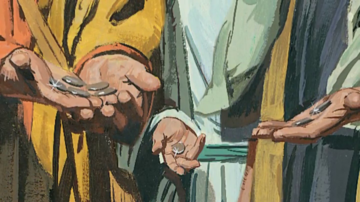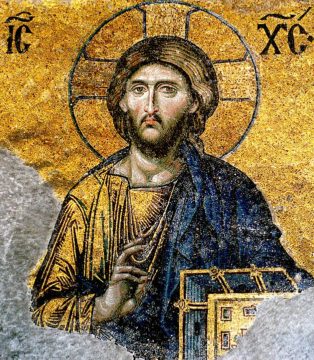On the Thirty-third Sunday of Ordinary Time, Fr. Paul Gallagher, OFM offers insights on yet another Gospel parable. The content is edited by Franciscan Sister of Christian Charity Sister Anne Marie Lom and Joe Thiel. The excerpts from the Sunday readings are prepared by Joe Thiel. To read or download the complete pdf with excerpts for your prayer, please click here Franciscan Gospel Reflection November 15 2020. Excerpts are from the Lectionary for Mass for Use in the Dioceses of the United States of America, second typical edition © 2001, 1998, 1997, 1986, 1970 Confraternity of Christian Doctrine, Inc., Washington, DC. Used with permission. All rights reserved. No portion of this text may be reproduced by any means without permission in writing from the copyright owner.
Matthew 25:14-30
Jesus told his disciples this parable. “It will be as when a man who was going on a journey called in his servants and entrusted his possessions to them. To one he gave five talents; to another, two; to a third, one–to each according to his ability. Then he went away.
Immediately the one who received five talents went and traded with them, and made another five. Likewise, the one who received two made another two. But the man who received one went off and dug a hole in the ground and buried his master’s money.
After a long time, the master of those servants came back and settled accounts with them. The one who had received five talents came forward bringing the additional five. He said, ‘Master, you gave me five talents. See, I have made five more.’ His master said to him, ‘Well done, my good and faithful servant. Since you were faithful in small matters, I will give you great responsibilities. Come, share your master’s joy.’ (Then) the one who had received two talents also came forward and said, ‘Master, you gave me two talents. See, I have made two more.’ His master said to him, ‘Well done, my good and faithful servant. Since you were faithful in small matters, I will give you great responsibilities. Come, share your master’s joy.’ Then the one who had received the one talent came forward and said, ‘Master, I knew you were a demanding person, harvesting where you did not plant and gathering where you did not scatter; so out of fear I went off and buried your talent in the ground. Here it is back.’ His master said to him in reply, ‘You wicked, lazy servant! So you knew that I harvest where I did not plant and gather where I did not scatter? Should you not then have put my money in the bank so that I could have got it back with interest on my return? Now then! Take the talent from him and give it to the one with ten.
For to everyone who has, more will be given and he will grow rich; but from the one who has not, even what he has will be taken away. And throw this useless servant into the darkness outside, where there will be wailing and grinding of teeth.'”
Background:
In the parable that is our text for this Sunday, the Master is going on a long journey and giving each of his servants an unbelievable sum of money. A talent was the equivalent of 6,000 denarii and one denarius was the usual daily wage. Even the servant who received one talent has received an enormous amount of money. The difference in the amount each has received is not the issue. The Master has placed a great amount of trust in each of the servants. The first two servants are very industrious and have found ways to double the master’s wealth. The last, however, has protected the master’s wealth out of fear, but returns it in full. He has not used what was given him so that it would increase.
When Jesus was telling the original parable, those who were hearing it would have been peasants who had little or no wealth. For them, a person who had so much wealth that he could have divided it among three servants would have been scandalous. They would have presumed that the wealth was gotten by depriving others. No matter how this rich person received the wealth, their culture would have believed that it should be used to expand his reputation in the community by sponsoring others who had little.
However, this person does not follow the cultural wisdom of day. The peasants who hear this parable in Jesus’ day might presume that those entrusted with the wealth were those who come from that segment of their society who did not care about their own reputations and might exploit others. Their patron, the source of their wealth, hides his reputation behind those who might exploit their neighbors for profit. The true nature of the master is not revealed until the last servant. “Master, I knew you were a demanding person, harvesting where you did not plant and gathering where you did not scatter…” The master’s response indicates that this servant’s remarks are not objectional to him. What is objectionable to him is that the servant did not put his wealth in with unscrupulous bankers of the day.
However, the gospel text did not end with the parable as Jesus told it to his peasant audience. Nor is their understanding the only way that Jesus’ parable was heard. Scholars believe that the last two verses were added by the Christian community. Those two verses give the parable a different meaning, one that emphasizes the generosity of the master who would give his wealth to servants. However, those servants will be held accountable for how they use the master’s gift. For those Christians, the parable becomes more about the faith that they have received than material wealth.
The 25th chapter of Matthew consists of three parables about the coming of the reign of God. The first parable is the parable of the ten virgins (Matthew 25:1-13) that was the gospel text last Sunday. The second parable is of the generous master who shares his wealth with his servants (Matthew 25:14-30); it is the gospel text for this Sunday. The last parable is that of the final judgment, when Jesus separates the sheep from the goats according to how they have treated the least among them (Matthew 25:31-46). This parable will be the text for next Sunday, the feast of Christ the King. Matthew begins the 26th chapter with Jesus speaking to his disciples of his approaching betrayal and death. “When Jesus had finished all these words, he said to his disciples, ‘You know that in two days’ time it will be Passover, and the Son of Man will be handed over to be crucified.’” (Matthew 26:1-2) By the end of the 26th chapter, Jesus is arrested and Peter has denied him three times. It will be helpful to understand these parables in light of their context in Matthew’s gospel, and in light of how the early Christians reflected on them to shed light on their own relationship to God.
Reflection Questions:
- What talents or treasures have you been given?
- Has your awareness of the giftedness of those talents and treasures changed during your life?
- Has the importance of how your gifts are used also changed during your life?
- What kind of temptations might arise because the master is a long time in returning?
- Do you value your faith relationship with God as a gift to you? What do you do to protect that gift, nurture it, and foster its development?
- Do you experience God’s invitation to “come share your master’s joy?”
- Can you take some time to talk to God about whatever it is that arises in you from this gospel?




